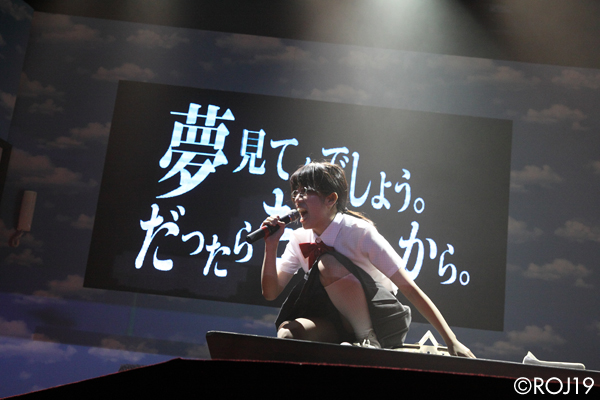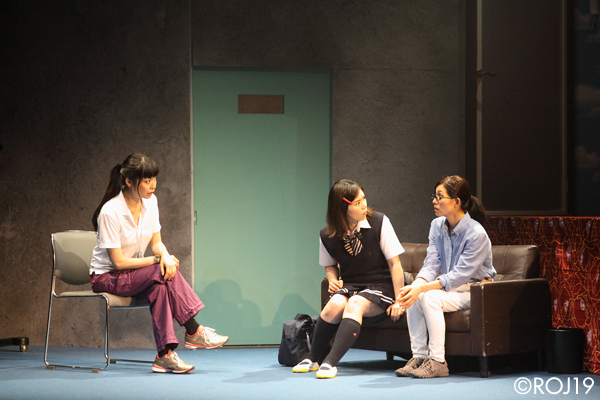

ROJI9 11th stage
Arakawa, God Killer Tune
(Jun. 29 – Jul. 3, 2016 at Tokyo Metropolitan Theatre – Theatre West)
Data
:
Premiere: 2014
Arakawa, God Killer Tune

Born in 1985, Kana Yamada is a playwright, director and actor. She leads the theater company ROJI9. After a career as a promoter for a recording company, she started the company ROJI9 in 2010. Since then she has done the company’s playwriting, direction and selection of music/scripts, as well as acting in its productions. The prominent themes her plays deal with are failure of communication in today’s increasingly diversifying contemporary society and the struggles of people who can’t fully become adults. The production of her play Title, Zekku (Title, Denial, 2013) about a delivery massage/prostitution establishment won Yamada the Sun-Mall Studio Best Directing Award, and her 2014 play Arakawa, God Killer Tune about the regrets of a woman about her past won the Grand Prix of the theater portal site CoRich Performing Arts Festival! 2014, and the Sun-Mall Studio Best Company Award. Yamada has also been active outside her company with projects such as scriptwriting and directing for the film Yoru, Nigeru (At Night, Flee, 2016).
ROJI9
http://www.roji649.com/


ROJI9 11th stage
Arakawa, God Killer Tune
(Jun. 29 – Jul. 3, 2016 at Tokyo Metropolitan Theatre – Theatre West)
Data
:
Premiere: 2014
The scene is a Karaoke room (the back of the stage has a large screen that the Karaoke videos are played on). Shoko (of her middle school past) is being told by her mother that she and her father are getting divorced. The now adult Shoko (I/me) is watching the scene from the side of the stage. “See. It’s just as I said. In the end, there is no [merciful] god anywhere,” she spits out in disgust.
Shoko has become a teacher that the middle school she went to in Arakawa and she is now engaged to marry one of her fellow teachers. Today, she is in the school’s reception room with one of the school’s female physical education teachers named Yamabe talking with a student who says she is being threatened by a stalker. The two teachers flinch at the seemingly far-fetched accusations the student is making. But, the school has also experienced incidents of sneak photos being taken of students in the lavatory.
Shoko tells the student, “We are on your side [to protect you].” To this, the student replies with a challenge, “So, if I was about to be killed by the stalker, would you die in my place?” These words revive traumatic memories of an incident from the past when Shoko was in middle school. One of her teachers named Ms. Mizuno was killed by a Karaoke establishment employee she was dating. This starts a chain of recollections for Shoko.
The scene shifts to a Karaoke room of Shoko’s middle school past. Shoko is talking about manga with a classmate named Momose, who has become Shoko’s first new friend after she transferred to the school in Arakawa because of her parents’ divorce and resulting relocation. Shoko’s dream is to become a manga writer/artist. Soon they are found by a wilder group of girls from the school including Morita and Kobayashi, who want to become TV personalities. They begin to mock the manga-loving Shoko and Momose. When one of the girls named Shiori has Shoko alone she tells her she will lend her a CD of the band Blankey Jet City, and then she begins to sing one of their hit songs,
Akai Tambourine
.
Again the scene is the Karaoke room of the past. Shoko and Shiori have become friends and they are here enjoying singing Karaoke together. Shoko has learned about a number of bands and singers from Shiori, like Ulfuls, Okuda Tamio and Elephant Kashimashi. Shiori always acts cheerful to excess, but in fact she is living with her single mother who is into religion and has abused Shiori. Shiori asks, “Is there really a god out there [watching over us]?”
The scene changes to a classroom at school. A dispute has erupted between Shoko and Morita because someone leaked the fact that Shoko has been criticizing Morita in a manga she is writing. To hurt Shoko, whom she can’t control, Morita tells her abusively that her friend Shiori is actually a liar who is sleeping with one of the employees of the Karaoke establishment, and that Shoko is just being used by her.
The scene shifts to a Karaoke room in the present. After work, the two teachers Shoko and Yamabe are there talking, spilling their grief about their boyfriends, their students and the world in general. Shoko’s fiancé, Muro, arrives to join them, but for some reason, Shoko’s attitude seems cold toward him. Muro tells Shoko that the name of the magazine model that was stabbed the day before is Morita.
As was her ambition, Morita had become a TV personality and model, but little work was coming her way. Her manager had been pressuring her to do a magazine spread wearing revealing gym shorts and top, but she fiercely resists this potential job. She attacks her manager verbally, saying, “Why don’t you just kill me.”
The scene changes to a classroom in Shoko’s middle school days. The teacher Mizuno is confessing to her student Shoko that things aren’t going well between her and her boyfriend. A cell phone rings. On the Karaoke screen appear the words: “Twenty hours after this phone call, Mizuno is found dead, wrapped in a blue vinyl sheet on the banks of the Arakawa River.”
The Karaoke room of the past. Momose is being bullied at school, and in a vengeful spirit she keeps telling Shoko to kill the character Morita in the manga she is writing, but Shoko refuses, saying that the manga is her world alone that no one can interfere with. After this disagreement, Momose leaves. To Shiori, who has just arrived as Momose is leaving, Shoko complains that Momose doesn’t understand other people’s feelings. As if nothing had happened, Shiori smiles and says, “Then, would you kill my parents [in your manga] instead?” As Shiori leaves she says that she hopes someday Shoko will write a manga about her.
The now-adult Morita and Kobayashi and others have gathered in a Karaoke room for the first time in a long while. Kobayashi is now married to the popular upperclassman she had a crush on in their student days, but she has found out that her husband is having an affair with Morita. She begins to press Morita to confess. Gone irate, Kobayashi pulls a kitchen knife from her bag.
Shoko is looking back and reflecting about the day of the end-of-school-year ceremony not long after her teacher Mizuno’s death. Shiori tells Shoko that she is transferring to another school. Now the adult Shoko looks around the unchanged classroom and with a puzzled expression says, “Isn’t there something strange here?” With that, the scene changes suddenly to the Karaoke room, where the song Red Tambourine is playing full-blast. Shoko sees her former self throw a microphone in the face of a man who is chasing after her teacher Mizuno with a knife.
We see the adult Shoko and her fellow teacher Yamabe involved again today in a heated discussion with the student who claims she is being threatened by a stalker. Angered beyond control by the completely egocentric attitude of the student, Shoko blurts out, “The whole problem is really with you, isn’t it?” Hearing this, Muro rushes to Shoko and tries to calm her down, but she rebuts him, saying, “I don’t want to be touched by someone like you who takes girls in high school uniforms to love hotels to take lewd pictures of them.” Then she shouts that he is surely the one taking sneak photographs of the girls at the school, too. Shoko doesn’t know what to believe in anymore.
We see a reenactment of the past from last meeting of Shiori and Shoko at the Karaoke room in their student days. The now-adult Shoko speaks, saying that she recently found out that Shiori had died due to abuse from her mother. “I should have protected her. I should have believed her. But I was too much of a child myself to do that.” Seeing her repenting about her past failings, Muro hugs Shoko. But she rebuffs him, shouting out loudly, “I hate all this!”
Momose, who followed her dream and has become a manga artist, is meeting with her editor in a Karaoke room. It appears that the publishing company is flooded with problems. “So, what do you think the god [that is supposed to be watching over us] is doing up there,” Momose mutters to herself.
As the intro to a Karaoke song starts to play the stage goes dark and the curtain falls.
Related Tags